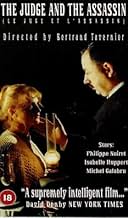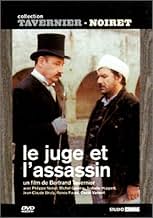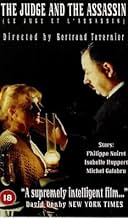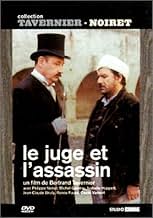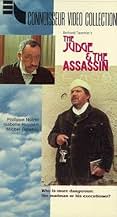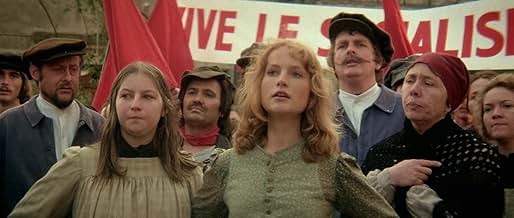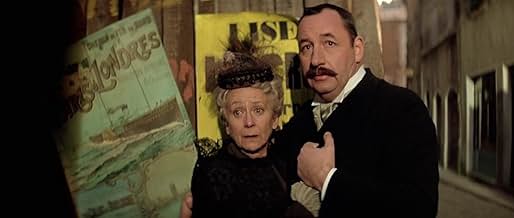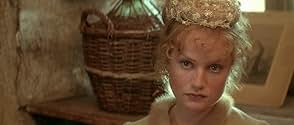Le juge et l'assassin
- 1976
- 2h 8m
ÉVALUATION IMDb
7,3/10
2,4 k
MA NOTE
Un ancien sergent d'infanterie instable commet des crimes atroces. Un juge réfléchit à la manière dont cette affaire pourrait profiter ou nuire à sa carrière.Un ancien sergent d'infanterie instable commet des crimes atroces. Un juge réfléchit à la manière dont cette affaire pourrait profiter ou nuire à sa carrière.Un ancien sergent d'infanterie instable commet des crimes atroces. Un juge réfléchit à la manière dont cette affaire pourrait profiter ou nuire à sa carrière.
- Prix
- 3 victoires et 4 nominations au total
Jean-Claude de Goros
- Dr. Dutourd
- (as Jean-Claude de Gorros)
Histoire
Le saviez-vous
- AnecdotesThis is a fairly straight-forward account of the crimes of Joseph Vacher. "Vacher" and "Bouvier" both mean "cowherd" in French. The names of many of the characters - like Lacassagne - have not been changed.
- ConnexionsFeatured in Keskiyön auringon kuvat (1987)
- Bandes originalesLa Complainte de Bouvier l'Éventreur
Music by Philippe Sarde
Lyrics by Jean-Roger Caussimon
Performed by Jean-Roger Caussimon
Commentaire en vedette
Director Bertrand Tavernier and actor Philippe Noiret collaborated in 9 films. The 1976 'Le juge et l'assassin' is the third film they made together and is a remarkable film in many ways. The story takes place in the last decade of the 19th century, in a France that is still living through the trauma of the Paris Commune and the defeat in the Franco-Prussian war, a country deeply divided by the Dreyfuss case, crushed by social inequalities that gave impetus to the socialist movement but also encouraged anarchist groups and terrorist attacks. Against this background, Bertrand Tavernier together with Pierre Bost and Jean Aurenche wrote the screenplay of a film describing the case of a serial killer, a kind of French Jack the Ripper, focusing on the characters of the criminal and of the judge who does everything to catch and condemn him.
Sergeant Joseph Bouvier is a veteran of the wars of France. He loves a young woman who rejects him, and in desperation he decides to kill her and commit suicide. Neither the assassination nor the suicide succeed, he is declared irresponsible, but after a few years the doctors consider him cured and release him. Adopting a vagabond life, prey to chronic physical and mental suffering and a morbid mysticism, he crosses France from North to South, killing and raping 12 victims on his way, most of them children or teenagers. Judge Emile Rousseau leads a typical bourgeois life in a provincial town, with a possessive mother and a mistress of lower social status. The Bouvier case gives him an opportunity to stand out, but to do so he must secure a conviction, prevent the serial killer from being declared insane, and turn him into a symbol of all that is rotten in France. Sort of a serial killer Dreyfuss. The confrontation between the two is not just a meeting between an accuser and a criminal. Rousseau has on his side not only the intelligence and cunning that will enable him to win Bouvier's confidence, but also a whole legal and political machine at the service of a social class that fears the changes that will sooner or later take place . In the end it is a confrontation between two faces of France, both corrupt and destructive.
Philippe Noiret is, of course, formidable as always. The role of the cunning, ariviste and morally corrupt judge suits him perfectly. The most remarkable acting performance, however, belongs to Michel Galabru, an actor who until then had only made himself known on screens in comic roles (among them a gendarme from Louis de Funès' troupe in Saint-Tropez). The role of Bouvier allows Galabru to create a complex character, in which madness mixes with passion, mystical fervor with intellectual poetry. The cast also features Isabelle Huppert, who at 23, in the secondary role of Rose, the judge's mistress, was beautiful and already master of that mysterious expression that would mark her great roles to come. Bertrand Tavernier has always known how to collaborate with classy professionals. Pierre-William Glenn's cinematography is impressive, especially in the nature scenes. Philippe Sarde's music plays a very important role. There are several sung scenes in the film - by an officer declaiming a patriotic song about lost Alsace and Lorraine, by a troubadour singing a ballad to the murderer-turned-folk-hero, by working women demonstrating for their rights in the final scene. These, together with the very carefully designed sets and costumes, make 'Le juge et l'assassin' an extremely expressive film in rendering the atmosphere of the era. The biggest problem with the script is the overly obvious rhetoric, which doesn't want to leave any doubt about the political views of the screenwriters and of the director. I didn't think that was necessary. The story itself is quite strong and speaks for itself, and the level of acting plus the Noiret - Galabru duel are expressive enough without being explicit. Bertrand Tavernier could have let the cinema art that he mastered so well tell the whole story. It would have been sufficient.
Sergeant Joseph Bouvier is a veteran of the wars of France. He loves a young woman who rejects him, and in desperation he decides to kill her and commit suicide. Neither the assassination nor the suicide succeed, he is declared irresponsible, but after a few years the doctors consider him cured and release him. Adopting a vagabond life, prey to chronic physical and mental suffering and a morbid mysticism, he crosses France from North to South, killing and raping 12 victims on his way, most of them children or teenagers. Judge Emile Rousseau leads a typical bourgeois life in a provincial town, with a possessive mother and a mistress of lower social status. The Bouvier case gives him an opportunity to stand out, but to do so he must secure a conviction, prevent the serial killer from being declared insane, and turn him into a symbol of all that is rotten in France. Sort of a serial killer Dreyfuss. The confrontation between the two is not just a meeting between an accuser and a criminal. Rousseau has on his side not only the intelligence and cunning that will enable him to win Bouvier's confidence, but also a whole legal and political machine at the service of a social class that fears the changes that will sooner or later take place . In the end it is a confrontation between two faces of France, both corrupt and destructive.
Philippe Noiret is, of course, formidable as always. The role of the cunning, ariviste and morally corrupt judge suits him perfectly. The most remarkable acting performance, however, belongs to Michel Galabru, an actor who until then had only made himself known on screens in comic roles (among them a gendarme from Louis de Funès' troupe in Saint-Tropez). The role of Bouvier allows Galabru to create a complex character, in which madness mixes with passion, mystical fervor with intellectual poetry. The cast also features Isabelle Huppert, who at 23, in the secondary role of Rose, the judge's mistress, was beautiful and already master of that mysterious expression that would mark her great roles to come. Bertrand Tavernier has always known how to collaborate with classy professionals. Pierre-William Glenn's cinematography is impressive, especially in the nature scenes. Philippe Sarde's music plays a very important role. There are several sung scenes in the film - by an officer declaiming a patriotic song about lost Alsace and Lorraine, by a troubadour singing a ballad to the murderer-turned-folk-hero, by working women demonstrating for their rights in the final scene. These, together with the very carefully designed sets and costumes, make 'Le juge et l'assassin' an extremely expressive film in rendering the atmosphere of the era. The biggest problem with the script is the overly obvious rhetoric, which doesn't want to leave any doubt about the political views of the screenwriters and of the director. I didn't think that was necessary. The story itself is quite strong and speaks for itself, and the level of acting plus the Noiret - Galabru duel are expressive enough without being explicit. Bertrand Tavernier could have let the cinema art that he mastered so well tell the whole story. It would have been sufficient.
- dromasca
- 8 août 2023
- Lien permanent
Meilleurs choix
Connectez-vous pour évaluer et surveiller les recommandations personnalisées
- How long is The Judge and the Assassin?Propulsé par Alexa
Détails
- Durée2 heures 8 minutes
- Mixage
- Rapport de forme
- 2.35 : 1
Contribuer à cette page
Suggérer une modification ou ajouter du contenu manquant

Lacune principale
By what name was Le juge et l'assassin (1976) officially released in India in English?
Répondre
![Regarder Bande-annonce [OV]](https://m.media-amazon.com/images/M/MV5BMGRkZTUzMWItY2NmZi00YWFhLTllZTMtZmQzNmFjNmFkY2M5XkEyXkFqcGdeQXRyYW5zY29kZS13b3JrZmxvdw@@._V1_QL75_UX500_CR0)
